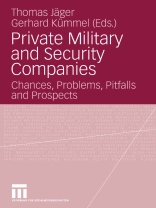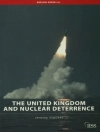Table of Content
History and Development.- Overseas Trade in Early Modernity and the Emergence of Embryonic Private Military Companies.- Does History Repeat Itself? A Comparative Analysis of Private Military Entities.- The Privatization of Military Affairs: A Historical Look into the Evolution of the Private Military Industry.- The Private Military Company: An Entity at the Center of Overlapping Spheres of Commercial Activity and Responsibility.- Soldiers of Misfortune: Is the Demise of National Armed Forces a Core Contributing Factor in the Rise of Private Security Companies?.- Private Security Companies: Agents of Democracy or Simply Mercenaries?.- Case Studies.- Searching for Resources, Offering Security … Private Military Companies in Sierra Leone.- Contracting in the Fog of War … Private Security Providers in Iraq: A Principal-Agent Analysis.- Privatization of Maritime Security in Southeast Asia.- No Contractors on the Battlefield: The Dutch Military’s Reluctance to Outsource.- Privatization in the German Armed Forces.- The Private Security Industry in Kenya: Issues and Challenges.- Private Security Guards as a Socio-Professional Group in Bulgaria.- The Civilianization of the US Military: Army and Navy Case Studies of the Effects of Civilian Integration on Military Personnel.- Problems and Prospects.- Human Rights and Private Military Companies: A Double-Edged Sword too Dangerous to Use?.- Liaisons Dangereuses: The Cooperation between Private Security Companies and Humanitarian Aid Agencies.- Private Security Companies and Civil-Military Cooperation.- Effective Peacekeeping and the Privatization of Security.- Norms versus Rationality: Why Democracies Use Private Military Companies in Civil Wars.- Back to the Future: Private Military Contractors and Political Theory in the Modern Democratic State.- Legal Issues and Patterns of Regulation.- Private Military Companies: The New Mercenaries? — An International Law Analysis.- Private Security and Military Companies under the International Law of Armed Conflict.- The Notion of ‘Direct Participation in Hostilities’ and Its Implications on the Use of Private Contractors under International Humanitarian Law.- Who is Responsible? The Use of PMCs in Armed Conflict and International Law.- Private Military Companies and Domestic Law in South Africa.- National Regulatory Regimes for PSMCs and their Activities: Benefits and Shortcomings.- Selling Security: Trade-Offs in State Regulation of the Private Security Industry.- Informal Regulation: An Economic Perspective on the Private Security Industry.- Conclusion.- PSMCs: Lessons Learned and Where to Go from here.
About the author
Prof. Dr. Thomas Jäger teaches Political Science, especially International Relations and Foreign Policy, at the University of Cologne (Germany).
Dr. Gerhard Kümmel is Senior Researcher at the Bundeswehr Institute of Social Sciences (SOWI) in Strausberg/Berlin (Germany), Vice-President of the Research Committee 01: Armed Forces & Conflict Resolution within the International Sociological Association, Associate Editor of ‘Armed Forces & Society’ and teaches Military Sociology at the University of Potsdam (Germany).












